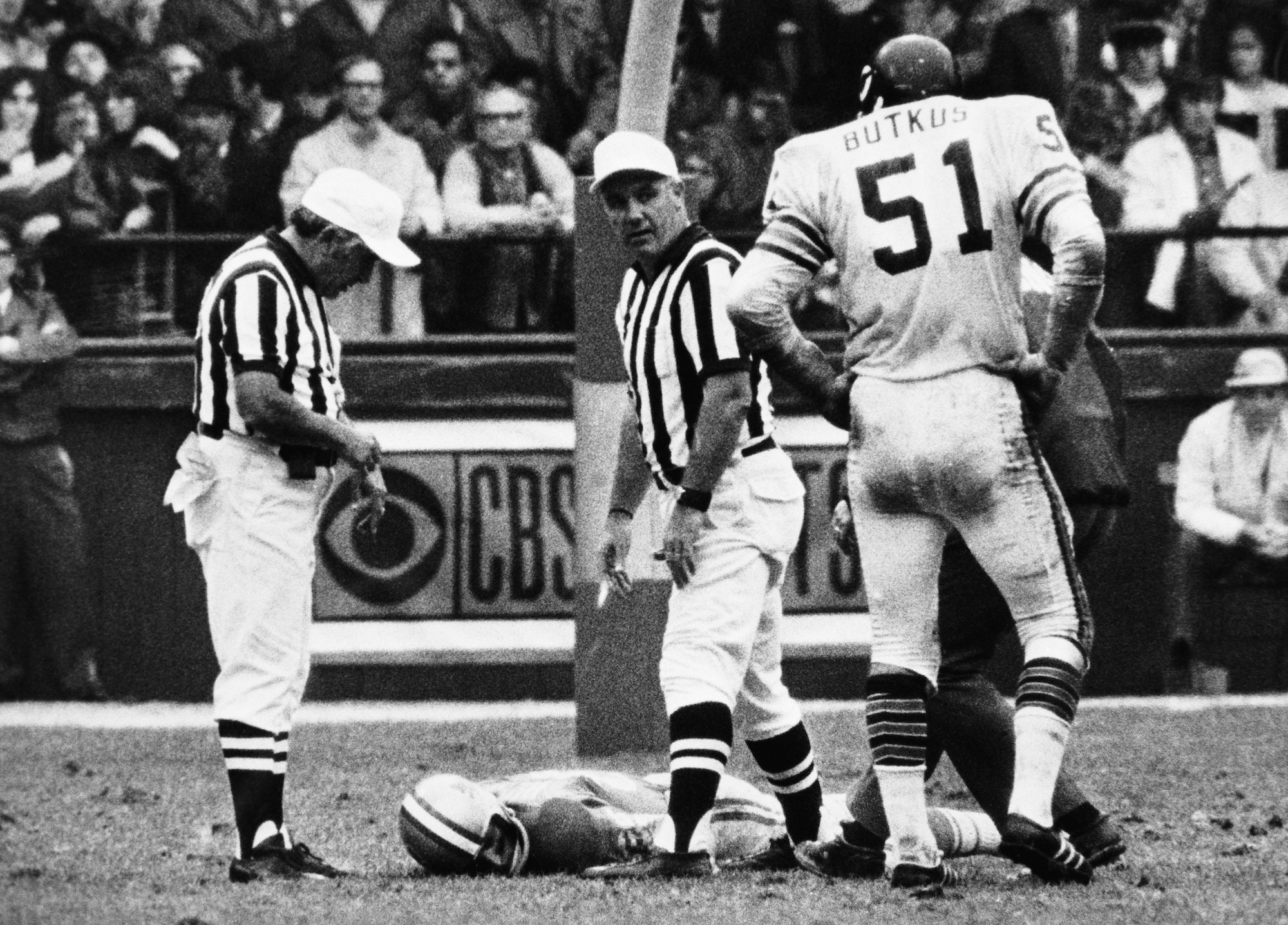NFL
The Tragic On-Field Death of Chuck Hughes May Have Sadly Stemmed From a Misdiagnosis

During the game, professional athletes may seem like superheroes, capable of playing through brutal injuries and performing feats of strength. Unfortunately, in 1971 Detroit Lions receiver Chuck Hughes reminded football fans everywhere of one painful reality: NFL players, at the end of the day, are human beings.
During an ordinary game against the Chicago Bears, Hughes suddenly collapsed. In front of a packed stadium, he tragically became the first and, to date only, NFL player to die on the field.
Chuck Hughes’ early football career
These days, Chuck Hughes’ name is mostly forgotten in the annals of NFL history; if anything, he’s remembered solely for his tragic, on-field death. That reality, however, overlooks his skills on the gridiron.
Hughes played his college football at UTEP, which, at the time, was still known as Texas Western. He spent three seasons with the Miners, catching a total of 168 receptions for 2,997 yards and 20 touchdowns. The vast majority of that production—1,634 yards and 13 touchdowns, came in one dominant 1965 season; the receiver also earned All-American honors for that campaign.
In 2006, UTEP inducted Hughes into their Hall of Fame. His profile, which is still live on the Miners’ official website, calls him “one of the most prolific receivers in school history.” His 1965 season was the best the program has ever seen and, his record of 13 100-yard receiving cames still stands strong.
Breaking into the NFL and suffering a heart attack
RELATED: The Tragic Death of Former Eagles Star Jerome Brown
After graduation, Chuck Hughes headed to the NFL, looking to make football a career. His time in the pros, however, wouldn’t be too successful by any metric.
In 1967, the Philadelphia Eagles selected Hughes in the fourth round of the draft. The receiver appeared in nine games that season but failed to catch a single pass; he also returned a handful of punts and kicks, but didn’t light the world on fire on special teams, either. He played two more seasons in the City of Brotherly Love, catching a grand total of six passes, before heading to Detroit via a trade.
Hughes’ first season with the Lions was the most productive of his career, as he finished the 1970 campaign with eight catches for 162 yards. At the start of 1971, however, things would begin to unravel.
As chronicled by Lee Carpenter for Yahoo Sports, Hughes took a big hit toward the end of a preseason game; after the final whistle, he collapsed and headed to the hospital. While doctors thought the receiver had simply injured his spleen, lungs, or kidneys, they couldn’t figure out exactly what was wrong. An autopsy, however, later suggested that the receiver suffered a serious spleen injury and, due to the pain, had a heart attack.
That undiagnosed heart attack would play a central role in Hughes’ tragic death.
Chuck Hughes’ tragic, on-field death stemmed from a misdiagnosis
RELATED: The Detroit Lions Cursed by Tragedy
After a brief stay in the hospital, Chuck Hughes rejoined his Detroit Lions teammates for the 1971 season. Unfortunately, things would end in tragedy.
On October 24, Hughes took the field to play the last few moments of the Lions’ game against the Chicago Bears. He caught one pass for 32-yards, absorbing a bit hit, and then returned to the huddle. A few plays later, after running a decoy route, the receiver collapsed.
“Dick Butkus, Chicago linebacker, was the first to reach him and called for the Lions’ doctors from the sidelines,” the New York Times reported. Those efforts, however, were in vain. “The stunning development sent Lions’ players from the team dressing room in tears,” the report continued. “Some muttered, ‘He’s dead, he’s dead.’ At Henry Ford Hospital, where he was taken, Hughes was pronounced dead at 4:41 PM.”
According to Carpenter’s Yahoo Sports piece, an autopsy determined “one of Chuck’s arteries was severely clogged and that a blood clot had broken loose—presumably from the hit on his last catch—and had become trapped in the artery, cutting off blood to the heart muscle. The report also mentioned ‘old scarring on the posterior wall of the heart,’ presumably a reference to the first heart attack Hughes was believed to have had.”
While it’s impossible to know how things could have gone differently, it’s safe to assume that a proper diagnosis could have saved Chuck’s life. His wife told Carpenter that he would be alive today if he knew the true extent of what happened in the preseason; Hughes’ siblings believe, at the very least, that he would have stopped playing football.
If Chuck Hughes had died on the field as the result of a freak accident, it would have already been a tragedy. His earlier misdiagnosis, however, makes the receiver’s death even more painful.
Stats courtesy of Sports-Reference and Pro-Football-Reference











